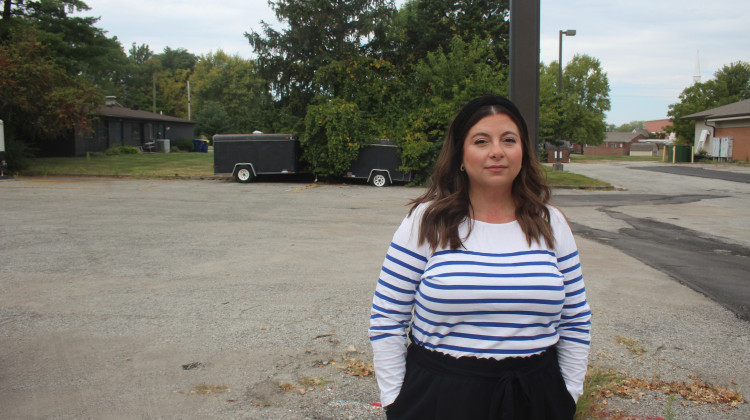
The inaugural class gets a picture with MC Hammer, Gov. Eric Holcomb and others to commemorate the day.
(Samantha Horton/IPB News)Inmates at the Indiana Women’s Prison will soon be the first outside of California to enroll in a computer coding seminar. The Last Mile program tries to reduce recidivism and train women for a career path where they’re underrepresented.
“We all need a second chance,” says MC Hammer, the musician known for "U Can't Touch This" and a board member of The Last Mile. “This is a country of second chances and these ladies deserve a second chance.”
Jennifer Fleming has been incarcerated for six years, with about two more to serve. She is one of 14 women selected to participate in the year-long Last Mile program. While she isn’t too tech savvy, Fleming says she’s ready to learn.
“This is an incredible opportunity that’s gonna give me a set of skills, that’s gonna take me in a direction that I had not ever even considered before,” says Fleming. “I do feel like this is going to allow me to get a career and that that is going to completely change not just my life, but the life of my children too.”
Fleming is a single mom of three and says being behind bars has made things tough.
“When a mother is incarcerated, it creates a tension in the family,” says Fleming. “Like I have a great relationship with all of my children, but being away from them has created a hardship for them.”
She hopes that through completing this program, her chances of getting a job will increase.
“Throughout this whole process I’ve realize that having a felony conviction, that puts me behind everybody else when it comes to the job pool,” says Fleming. “I feel that this opportunity will even the playing field.”
The one-year course will teach computer coding and soft skills aimed at helping graduates get jobs upon release. Participants will learn HTML, CSS and JavaScript to build web applications.
Last Mile program co-founder and executive director, Beverly Parenti, says it’s not just about gaining coding experience, but also soft skills that’ll help the women seek and keep jobs.
“We really do believe that the soft skills are vitally important,” says Parenti. “The women in this program are going to work as a team, they are going to be helping each other, they’re going to learn interview skills.”
Outside of classroom costs, the program itself is about $5,000 a year. Parenti says, from what has been seen in California where the program begin in 2014, that money is made back through the reduction of recidivism.
“We want to reduce recidivism and save the spending on prisons,” says Parenti.
According to the Indiana Department of Corrections, there are more than 25,000 people incarcerated in 22 state prisons. There is a 37 percent recidivism rate in the first three years post-release and 75 percent unemployment rate among formerly incarcerated adults one year post-release.
The Last Mile has had zero recidivism for formerly incarcerated people and 100 percent employment for returned citizens.
Gov. Eric Holcomb says this program is not only a win for the inmates, but also taxpayers.
“When you stop and think of the hundreds of millions of dollars that we spend year after year after year, how are we going to bring that recidivism rate down so that those dollars go further to help more people,” says Holcomb. “This is the way to do it.”
He says businesses are already asking about hiring graduates of the program.
The first day of class is Monday April 9.
 DONATE
DONATE







 Support WFYI. We can't do it without you.
Support WFYI. We can't do it without you.